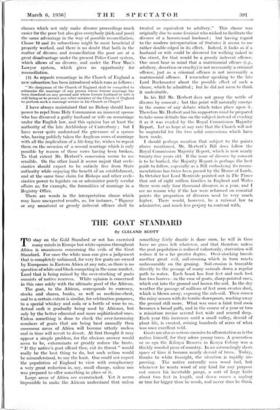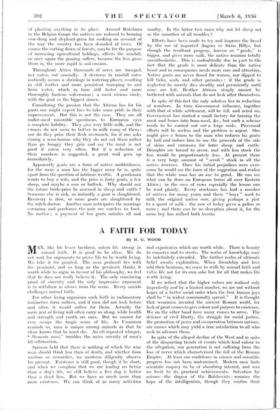THE GOAT STANDARD
By CLELAND SCOTT
TO stay on the Gold Standard or not has exercised many minds in Europe but white opinion throughout Africa is unanimous concerning the evils of the Goat Standard. For once the white man can give a judgement that is completely unbiassed, for very few goats arc owned by Europeans in Eastern Africa at any rate, so there is no question of white and black competing in the same market. Land that is being ruined by the over-stocking of goats consists of native reserves. White opinion is concerned in this case solely with the ultimate good of the African.
The goat, to the African, corresponds to currency, stocks and shares, banks, as well as medicine-chest, and to a certain extent is similar, for celebration purposes, to a special whiskey and soda or a bottle of wine to us. -Actual cash is gradually being used by Africans, but only by the 'better educated and more sophisticated 'ones. Unless something is done to check the ever-increasing numbers of goats that are being bred annually then enormous -areas of Africa will become utterly useless and in time will revert to desert. At first thought it may appear a simple problem, for the obvious answer would seem to be; exterminate or greatly reduce the brute. " If thy native's goat offend thee, cut its throat " would really be the best thing to do, but such action would be misunderstood, to say the least. One could not expect the population of England to 'view with complacency a very great reduction in, say, small change, unless one was prepared to offer something in place of it.
Large areas of Africa are overstocked. Yet it seems impossible to make the African understand that unless something fairly drastic is done soon, he will in time have no grass left whatever, and that therefore unless the goat population is reduced voluntarily, starvation will reduce it to a far greater degree. Over-stocking breeds another great evil, soil-erosion, which in turn reacts unfavourably on the grazing. Soil-erosion is traceable directly to the passage of many animals down a regular path to water. Each beast has four feet and each foot has two hooves—in the case of goats, sharp-pointed ones, which cut into the ground and loosen the soil. In the dry weather the passage of millions of feet soon creates dust, which is blown away, exposing the sub-soil. Then comes the rainy season with its terrific downpours, washing away the ground still more. What was once a faint trail soon becomes a broad path, and in the course of a year or two a miniature ravine several feet wide and several deep. Each year this increases until a small valley, devoid of plant life, is created, ruining hundreds of acres of what 'was once excellent veld.
Goats are also as serious enemies to afforestation as is the native himself, for they adore young trees. A generation or so ago the Kikuyu Reserve in Kenya Colony was a thickly wooded piece of country. In an astoundingly short space of time it became nearly devoid of trees. Today, thanks to white foresight, the situation is rapidly im- proving. The native naturally uses wood fuel, but whenever he wants wood of any kind for any purpose out comes his inevitable panga, a sort of large knife about two feet in length, and down comes a sapling or tree far bigger than he needs, and never does he think of planting anything in its place. Around Rutchuru in the Belgian Congo the natives are reduced to burning cow-dung and elephant-grass for cooking on account of he way the country has been denuded of trees. Of course the cutting down of forests, maybe for the purpose of increasing agricultural holdings, affects the rainfall, so once again the grazing suffers, because the less grass there is, the more rapid is soil-erosion.
Throughout Africa thousands of acres arc tramped, not eaten, out annually. A decrease in rainfall auto- matically- means a shrinkage in watering places, resulting in still further and more persistent tramping to and from water, which in turn still faster and more t horoughly hastens soil-erosion ; a most vicious circle, u ith the goat as the biggest sinner.
Considering the passion that the African has for his goats one might expect him to take some pride in their improvement. But this is not the case. They are all under-sized miserable specimens, to European eyes a complete liability. They give very little milk, and the owners do not seem to bother to milk ninny of them : nor do they prize their flesh overmuch, for if one asks during a semi-famine why they do not eat them rather than go hungry they grin and say the meat is not good if eaten very often. But if a reduction of their numbers is suggested, a great wail goes up immediately.
Apparently goats are a form of native snobbishness, for the more a man has the bigger noise he is, quite apart from the question of intrinsic wealth. A gentleman wants to buy a wife, and the price is forty goats, a few sheep, and maybe a cow or bullock. Why should not the future bride-price be assessed in sheep and cattle ? Someone else is sick, so instantly a goat is slaughtered. Recovery is slow, so more goats arc slaughtered by t he witch doctor. Another man anticipates the marriage ceremony and perchance the pair are careless to boot. No matter ; a payment of ten goats satisfies all and sundry. In the latter two cases why not let sheep act as the smoother of all troubles ?
Efforts have been made to try and improve the breed by the use bf imported Angora or Swiss Billys, but though the resultant progeny, known as " grade," is bigger, and gives more milk, the native remains totally unenthusiastic. This is undoubtedly due in part to the fact that the grade is more delicate than the native beast and in consequence needs more care and attention. Native goats are never dosed for worms, nor dipped to kill ticks, scab, and other parasites : if the grade is neglected he merely dies steadily and persistently until none arc left. Brother African simply cannot be bothered with animals that do not look after themselves.
In spite of this fact the only solution lies in reduction of numbers. In time Government influence, together with that of white settlement, will be felt and acted on. Government has started a small factory for turning the meat and bones into bone-meal, &c., but such a scheme needs to be carried out on‘ a large scale. Piecemeal efforts will be useless and the problem is urgent. One might give a bonus to the man who reduces his goats by half and induce him to use the proceeds of the sale of skins and carcasses for better sheep and cattle. Droughts are bound to occur, and with less stock the loss would be proportionately less. At present there is a very large amount of " scrub " stock in all the native reserves. Once his initial prejudices were over- come he would see the force of the suggestion and realise that the white man has no axe to grind. lie can see what can be done on European farms all over Eastern Africa ; in the ease of cows especially the lesson can be read plainly. Every stockman has had a number of natives for many years and these " boys " used to milk the original native cow, giving perhaps a pint to a quart of milk : the cow of today gives a gallon or more ; and there can be no deception about it, for the same boy has milked both beasts.

















































 Previous page
Previous page